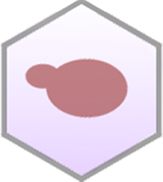YAR009C
- Systematic Name
- YAR009C
- SGD ID
- SGD:S000000067
- Aliases
- YARCTyB1-1
- Feature Type
- transposable element gene
- Description
- Retrotransposon TYA Gag and TYB Pol genes; Gag processing produces capsid proteins, Pol is cleaved to produce protease, reverse transcriptase and integrase activities; in YARCTy1-1 TYB is mutant and probably non-functional; protein product forms cytoplasmic foci upon DNA replication stress 1 2 3
- Comparative Info
-

Sequence
The S. cerevisiae Reference Genome sequence is derived from laboratory strain S288C. Download DNA or protein sequence, view genomic context and coordinates. Click "Sequence Details" to view all sequence information for this locus, including that for other strains.
- Summary
- YAR009C is located on the right arm of chromosome I between SEN34 tRNA splicing endonuclease subunit and YAR010C retrotransposon TYA Gag gene co-transcribed with TYB Pol; coding sequence is 3591 nucleotides long
Analyze Sequence
S288C only
BLASTN | BLASTP | Design Primers | Restriction Fragment Map | Restriction Fragment Sizes | Six-Frame Translation
S288C vs. other species
Protein
Basic sequence-derived (length, molecular weight, isoelectric point) and experimentally-determined (median abundance, median absolute deviation) protein information. Click "Protein Details" for further information about the protein such as half-life, abundance, domains, domains shared with other proteins, protein sequence retrieval for various strains, physico-chemical properties, protein modification sites, and external identifiers for the protein.
- Length (a.a.)
- 1196
- Mol. Weight (Da)
- 136746.7
- Isoelectric Point
- 8.9
Gene Ontology
GO Annotations consist of four mandatory components: a gene product, a term from one of the three Gene Ontology (GO) controlled vocabularies (Molecular Function, Biological Process, and Cellular Component), a reference, and an evidence code. SGD has manually curated and high-throughput GO Annotations, both derived from the literature, as well as computational, or predicted, annotations. Click "Gene Ontology Details" to view all GO information and evidence for this locus as well as biological processes it shares with other genes.
View computational annotations
Molecular Function
- Manually Curated
- enables DNA-directed DNA polymerase activity (ISS)
- enables peptidase activity (ISS)
- enables RNA binding (ISS)
- enables RNA nuclease activity (ISS)
- enables RNA-directed DNA polymerase activity (ISS)
Biological Process
- Manually Curated
- involved in retrotransposition (ISS)
Phenotype
Phenotype annotations for a gene are curated single mutant phenotypes that require an observable (e.g., "cell shape"), a qualifier (e.g., "abnormal"), a mutant type (e.g., null), strain background, and a reference. In addition, annotations are classified as classical genetics or high-throughput (e.g., large scale survey, systematic mutation set). Whenever possible, allele information and additional details are provided. Click "Phenotype Details" to view all phenotype annotations and evidence for this locus as well as phenotypes it shares with other genes.
No phenotype data available.
Interaction
Interaction annotations are curated by BioGRID and include physical or genetic interactions observed between at least two genes. An interaction annotation is composed of the interaction type, name of the interactor, assay type (e.g., Two-Hybrid), annotation type (e.g., manual or high-throughput), and a reference, as well as other experimental details. Click "Interaction Details" to view all interaction annotations and evidence for this locus, including an interaction visualization.
9 total interactions for 7 unique genes
Physical Interactions
- Affinity Capture-MS: 5
- Affinity Capture-RNA: 1
- Two-hybrid: 2
Genetic Interactions
- Phenotypic Enhancement: 1
Summary Paragraph
A summary of the locus, written by SGD Biocurators following a thorough review of the literature. Links to gene names and curated GO terms are included within the Summary Paragraphs.
Last Updated: 2007-03-26
Literature
All manually curated literature for the specified gene, organized into topics according to their relevance to the gene (Primary Literature, Additional Literature, or Review). Click "Literature Details" to view all literature information for this locus, including shared literature between genes.